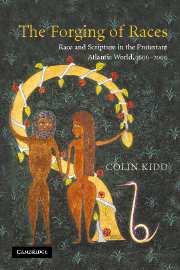Book contents
- Frontmatter
- Contents
- Acknowledgements
- 1 Prologue: Race in the Eye of the Beholder
- 2 Introduction: Race as Scripture Problem
- 3 Race and Religious Orthodoxy in the Early Modern Era
- 4 Race, the Enlightenment and the Authority of Scripture
- 5 Monogenesis, Slavery and the Nineteenth-Century Crisis of Faith
- 6 The Aryan Moment: Racialising Religion in the Nineteenth Century
- 7 Forms of Racialised Religion
- 8 Black Counter-Theologies
- 9 Conclusion
- Notes
- Index
3 - Race and Religious Orthodoxy in the Early Modern Era
Published online by Cambridge University Press: 05 June 2012
- Frontmatter
- Contents
- Acknowledgements
- 1 Prologue: Race in the Eye of the Beholder
- 2 Introduction: Race as Scripture Problem
- 3 Race and Religious Orthodoxy in the Early Modern Era
- 4 Race, the Enlightenment and the Authority of Scripture
- 5 Monogenesis, Slavery and the Nineteenth-Century Crisis of Faith
- 6 The Aryan Moment: Racialising Religion in the Nineteenth Century
- 7 Forms of Racialised Religion
- 8 Black Counter-Theologies
- 9 Conclusion
- Notes
- Index
Summary
Race was not a central organising concept of intellectual life or political culture during the early modern era. Ironically, during the age of European expansion, when so many indigenous peoples of the New World and transported slaves from Africa suffered at the hands of exploitative white Europeans, white domination did not rest on articulate theories of white racial superiority. Other arguments – whether derived from the Christian imperative to spread the Word of God through missions or from theories of natural law concerning the connection between proper use of the land and rights to its ownership – were used to justify European superiority and expropriation. Racial identity was subliminal, though no less potent in its effects. ‘Whites’ conquered the world without any overt ideology of white superiority.
Although doctrinal racism was not a feature of the early modern Atlantic world, the absence of racialist doctrine did not mean that racist prejudice was similarly invisible. Racist attitudes existed, but, significantly, did not rest upon clearly articulated theories of racial difference. Race – like ethnicity and even national consciousness (as distinct, say, from allegiance to one's monarch) – was a matter of second-order importance behind primary commitments to church and state. Political and confessional alignments were more prominent than pride in ethnic or racial identities.
Forms of early modern racism did exist, but they should not be parsed anachronistically in terms of modern expectations about their sources, idioms or resonance. There were intellectual limits to racial consciousness.
- Type
- Chapter
- Information
- The Forging of RacesRace and Scripture in the Protestant Atlantic World, 1600–2000, pp. 54 - 78Publisher: Cambridge University PressPrint publication year: 2006
- 1
- Cited by



